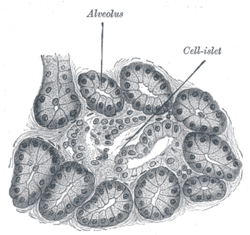Infrastructure tools to support an effective radiation oncology learning health system
Contents
| Alveolar gland | |
|---|---|
 Section of pancreas of dog. X 250. | |
| Identifiers | |
| TH | H2.00.02.0.03028 |
| Anatomical terminology | |
Alveolar glands, also called saccular glands, are glands with a saclike secretory portion, in contrast with tubular glands. They typically have an enlarged lumen (cavity), hence the name: they have a shape similar to alveoli, the very small air sacs in the lungs.
Some sources draw a clear distinction between acinar and alveolar glands, based upon the size of the lumen.[1] A further complication in the case of the alveolar glands may occur in the form of still smaller saccular diverticuli growing out from the main sacculi.
The term "racemose gland"[2] is used to describe a "compound alveolar gland" or "compound acinar gland."[3]
Branched alveolar glands are classified as follows:
| Type | Description | Location | |
|---|---|---|---|

|
simple branched acinar |
thyroid glands | |

|
tubuloalveolar or tubulo-alveolar or tubulo-acinar or compound tubulo-acinar or compound tubuloalveolar[4] |
glands that start out as simple branched tubular, and branch further to terminate in alveoli | salivary glands,[5] esophagus[6] mammary glands |
Additional images
-
Alveoli of lacrimal gland.
-
Human submaxillary gland. At the right is a group of mucous alveoli, at the left a group of serous alveoli.
-
Section of portion of breast tissue.
See also
References
- ^ Classification of Exocrine Glands
- ^ Racemose+gland Archived 2012-10-13 at the Wayback Machine at eMedicine Dictionary
- ^ SIU SOM Histology GI
- ^ Histology at KUMC glands-glands17
- ^ Histology at KUMC glands-glands14 "Compound Tubulo- Alveolar"
- ^ MedEd at Loyola histo/practical/epithelium/hp1-28.html




















